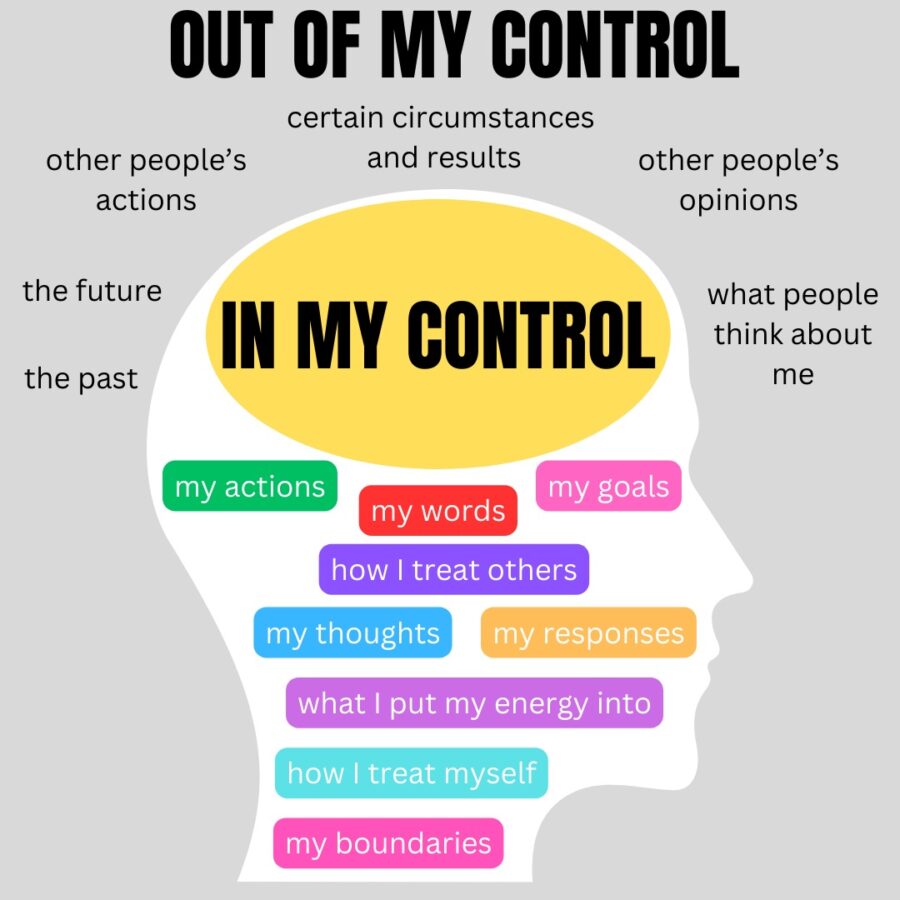The kids are fighting and it won’t stop. The driver behind you just hit your bumper. The women in the supermarket are glaring at you whispering while you wait for the self-checkout cashier to come assist you with the broken credit card machine.
What do all of these scenarios have in common? Each circumstance describes events that were frustratingly out of your control. But, your response to those events is under your control.
In the course of life, it is common to become overwhelmed by the myriad of circumstances and events that unfold around us. The pace of modern day life, accompanied by the unpredictability of the world, can leave you feeling powerless. Feeling like we have control over situations leads to a false sense of security. Predicting what will happen and how it will happen is reassuring and we sigh in relief when expected things happen, especially in the manner in which we want it to happen. When we know what to expect, manage what is happening, and prepare the groundwork for situations, we usually don’t have to worry about uncertainties, deviations, setbacks, and negative feelings. Sometimes we grasp at straws in an effort to force things to go the way we want. And when it doesn’t, it is very difficult to cope with or navigate through the unexpected circumstances. It is difficult to accept uncomfortable and challenging realities.
The key to navigating this complexity lies in understanding what we can control. Inner peace comes from acceptance– embracing what we can and what we cannot control. By distinguishing between these two realms, we can lead more purposeful and less stressed lives. We find liberation by coming to terms with and fully surrendering to the notion that we cannot always piece together all of the components of our everyday life.

What You Can Control
Your Actions– You choose what you are going to do in your everyday life. You take action on what you are going to do. At the core of personal control is the ability to choose your actions and decisions. Whether in small daily tasks or significant life choices, you have the power to determine how you behave. You can choose to take steps that enhance your mental health such as meditating, journaling, expressing gratitude, and positive self-talk. Every decision, from what you eat for breakfast to how you respond to a challenge at work, is within your sphere of influence. Aligning your actions with your core values provides a sense of purpose and direction.
Your Words and Your Responses– While external circumstances can be tough, how you perceive and react to them is within your control. You choose how you communicate your feelings, opinions, and beliefs. You can choose to bottle up your feelings or you can decide to (respectfully) convey them to others. You can clarify misunderstandings and you can ask for clarification when you need a better understanding. You can ask someone to forgive your mistakes, and you can accept others’ contrition. You decide how you are going to respond to what other people do to you.
Your Goals– It is up to you to delineate, strive, and take measures towards meeting your personal goals. You can decide to focus on progress– not perfection– in achieving your goals and give yourself patience and grace during the process. You have the authority to determine what is important to you and how you wish to live your life.
How You Treat Others– You have control over how you interact with the people around you. Choosing kindness, empathy, and respect in your interactions not only positively impacts others but also reinforces your own sense of integrity, happiness, and empowerment. When others are hurting instead of trying to save or fix them (controlling their situations), you can express concern by letting them know you support them, you care, and you are there to help as much as you can. Conversely, when others hurt or frustrate you, you have the power to respond with grace and honor.
Your Thoughts- The thoughts that saturate and fill your mind affect your overall well-being in daily life. What you think about and how you perceive and think about things determines how you feel. You can choose to embrace positive thoughts or remain stagnant in negative thinking. Admittedly, it is often difficult to dig yourself out of the pit of negative thoughts and emotions. Strengthening your mental health by incorporating strategies such as meditating, journaling, positive self-talk, affirmations, praying, and reading self-improvement texts are wonderful tools to wield when times get tough.
What You Put Your Energy Into– You choose what you want to put your energy into– incorporating things that are important or enjoyable to you are good for your mental health. How much effort you put into your work, relationships, and personal growth is entirely up to you. While outcomes are not always guaranteed, your commitment and dedication are within your control. Consistent effort often leads to personal satisfaction and growth, regardless of external results.
How You Treat Yourself– You can decide how to treat your body– what you put into it, whether or not you engage in physical activity, and how you care for it. You are in control how preventative health measures you take, such as scheduling and following up with doctors’ appointments. Additionally, you choose the way you treat your mind. Are you engaging in positive self-talk? Do you show yourself forgiveness, grace, and patience? Treating yourself with kindness leads to a better mental health.
Your Boundaries– You decide how you want to be treated and set clear boundaries for others if you feel they are overstepping. You can communicate your thoughts and feelings to others if you are hurt by their words or actions. And if they continue to break the barriers you set in place, you have the power to take measures that ensure your feelings and wishes do not continue to be violated.
What You Cannot Control
Other People’s Actions and Reactions- What other people choose to do and say is ultimately their decision. It can be difficult to see people we care about make negative choices. Although we can offer helpful advice or guidance, we cannot make people do things that we feel is in their best interest. No matter how much you might wish otherwise, you cannot control how others behave or respond.
What People Think About You– The world is an eclectic group of people with varying beliefs, backgrounds, and values. Understanding that concept can help you in acknowledging that people will have thoughts, and perhaps judgments, about your way of life. If people express their opinions about you, realize you control how you respond to their words. If people do not communicate their thoughts with you, accept that you cannot read others’ minds and it is not your responsibility to fully know what they are thinking.
Other People’s Opinions– Instead of wanting to change others’ beliefs or opinions, remember that you don’t need to see eye-to-eye on everything to have a strong relationship; there should just be mutual respect towards each other. People have their own beliefs, motivations, and emotional triggers. Attempting to control or change others often leads to frustration and strained relationships. Instead, focus on your own actions and how you can respond to others in a constructive way. People will have opinions about you, your life choices, and your actions. Trying to control or change these opinions is often futile. Instead, focus on living according to your values and principles, and let go of the need for external validation.
Certain Circumstances and Results- Despite your best efforts, certain outcomes are out of your hands. Whether it’s the result of a job application, a medical diagnosis, or a personal project, the end result may not always align with your expectations. It is beneficial to recognize that results are not necessarily a reflection of the efforts you have taken in trying to gain particular outcomes. Find self-satisfaction and empowerment in your perseverance and diligence.
The Past and the Future- Instead of ruminating over past experiences or events, let it go or think about what you could change from that occurrence and learn from it. What changes could you initiate as you move forward? What actions or steps can you take moving forward to circumvent any mistakes that may be lingering in your mind? The only time you truly have control over is the present moment. Learning to live in the now, without dwelling too much on the past or future, can lead to greater peace and satisfaction. Instead of projecting into future worries and uncertainties, redirect yourself back to the present. The future is unknown and will play out eventually.
An essential component in finding peace in your life lies in recognizing and embracing the balance between control and acceptance. By focusing on what you can control—your actions, mindset, and responses—you allow yourself to live a life aligned with your values. At the same time, by accepting what you cannot control, you free yourself from worry and frustration.
Practice daily mindfulness and reflection. Ask yourself, “Is this something I can change?” Be honest with your answers. If your answer is yes, take proactive measures. But if the answer is no, accept it and find ways to adjust and move forward.
Realize that certainty and peace do not come from trying to control everything. Realize that making the most of what is within your power actually dispels feelings of fear, anxiety, and stress. This mindset leads to greater emotional stability, better relationships, and a deeper sense of contentment in the face of life’s uncertainties.



Accepting the things we cannot change is difficult, but changing our mindset and responses to certain situations will lead to less stress. Thank you for these tips!